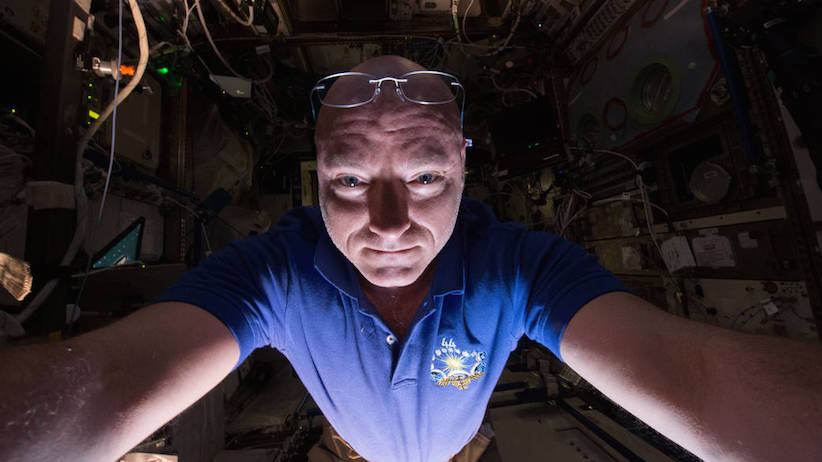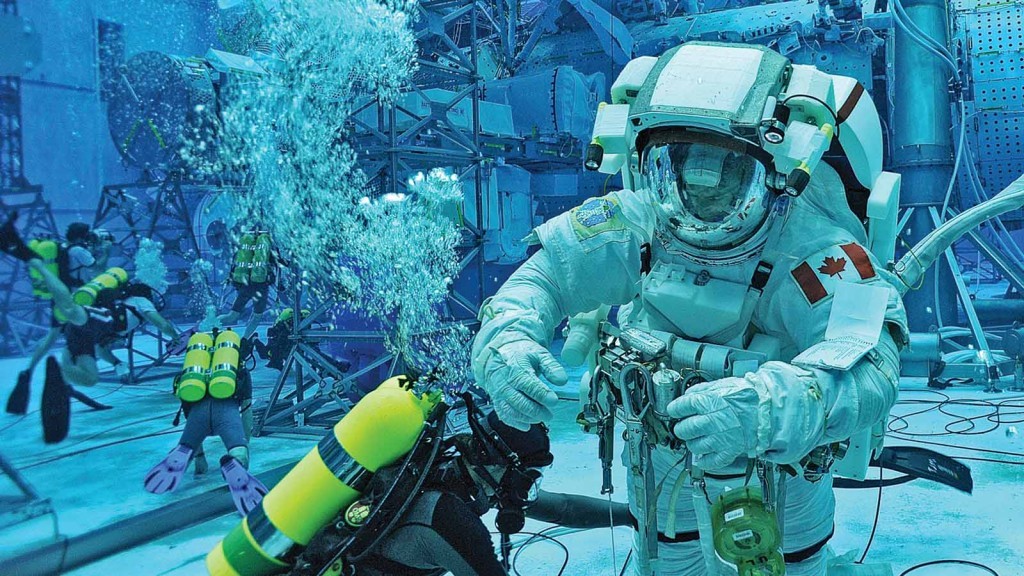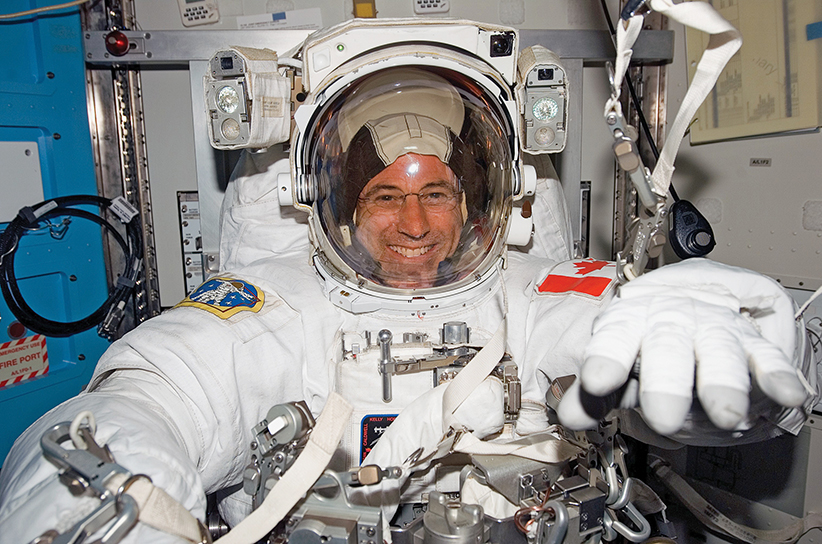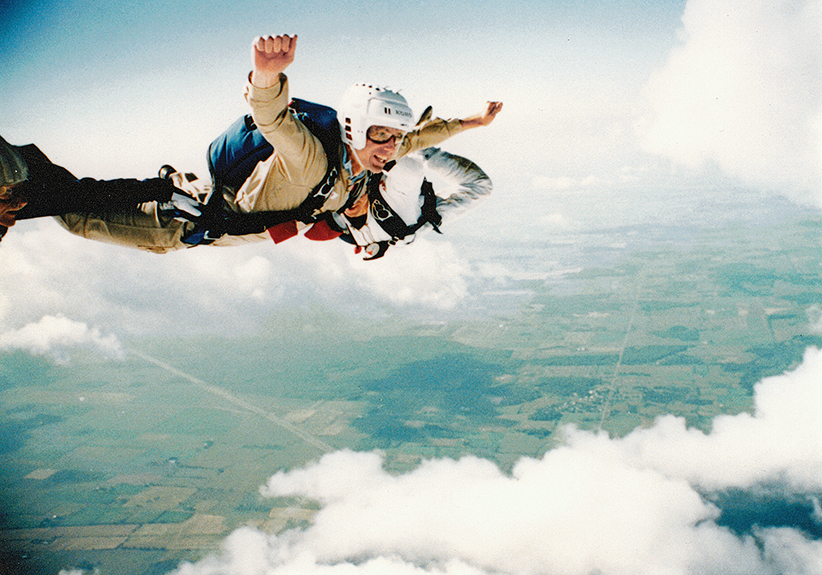Welcome home, Scott Kelly: Canada’s spacemen greet a record-breaker
After a #YearInSpace—340 days, to precise—on the International Space Station, Scott Kelly is back on Earth with Mikhail Kornienko
In this undated photo provided by NASA on Tuesday, March 1, 2016, astronaut Scott Kelly looks out the cupola of the International Space Station. Kelly closes the door Tuesday to an unprecedented year in space for NASA, flying back to the planet and loved ones he left behind last March. (NASA via AP)
Share

After a 340-day stint on the International Space Station, NASA astronaut Scott Kelly and Russian cosmonaut Mikhail Kornienko have safely landed back on Earth.
The pair had been roommates in their year-long voyage around Earth—an effort to test the effects of space on the human body as research picks up on travelling to Mars.
Maclean’s reached out to three current or former Canadian astronauts to hear how they’d greet the conquering astronaut and what advice they’d give Kelly, who smashed NASA’s record for longest stay in space.
Related: Read Maclean’s Space Issue to better understand the great unknown

David Saint-Jacques, CSA astronaut
Q: What would you like to say to Scott as he returns?
A: Welcome home, Scott, from your epic adventure in space. We’ve been looking forward to hearing your stories face-to-face.
Here I am outside my office, with trees and a breeze. It looks a bit like a university campus. I wish him to enjoy the fresh air and walking outside. I wish him a smooth landing, of course, and smooth landing back to his life with Earthlings. There are a lot of people here on the planet. I wish he’ll take time to slip back into human society.
Q: What will his return be like?
A: He’ll land in Kazakhstan, in a giant desert. You can imagine the landing of a spacecraft—not super precise, so they don’t want to do it in a city. A search and rescue team from the military is going to look for him. A NASA business jet will whisk him away, and he will land in Houston. We have a huge banner with photos—funny photos. These things are signed with hundreds of signatures from everyone behind the scenes at mission control.
He’s going to have to get used to gravity. It’s unforgiving. He’s going to be dizzy and heavy for a week. He’ll be in quarantine for a little while. He’ll be like a guinea pig for medical experiments for a couple of weeks. After that, he will come back to rank and file like everybody else. There’s the upsides: the sunshine, the breeze, your friends, the food. And there’s the downsides: he’s going to be poked and prodded for weeks and weeks. Before your body can adapt and become a normal person, you gotta cram in all these experiments and tests.
Then he’ll embark on a public tour for public outreach. His family will be with him from day one.
Q. What advice do you have for Scott on his return?
A: Pace yourself. There are going to be a lot of people around. I would want to go back to life on Earth as soon as possible, but you need time to adjust gracefully and healthily and slip back in.
[Also,] put sunscreen on. He’s probably forgotten about that. And put things on the table before letting go of them. In space, if you have a tool and want to scratch your nose, you just leave it there and scratch your nose. Don’t do that on Earth, not with coffee.
Q: Anything else?
A: I want to thank him also because he’s an inspiration for me. He’s very smart but extremely humble. There aren’t two Scotts. There’s just Scott. It’s take-him-as-he-is Scott. He left a note on his desk: ‘In space. Back in a year.’ ”
From our Space Issue: Saint-Jacques on what it’s like to become an astronaut

David Williams, CSA astronaut and mission specialist, current CEO of Southlake Regional Health Centre
Q: What does Scott’s trip mean for space exploration?
A: As we sit on the deck at the cottage [near Bancroft, Ont.] watching the Space Station go by, it’s amazing to think Scott’s on board. This mission is very profoundly important to understand all the medical challenges for humans in space. Because Scott’s identical twin Mark was on the ground, Mark will be going through all the medical tests, too. It’s critical in taking humans beyond the Earth’s orbit. It’s my personal opinion that there are benefits to getting humans on Mars. We were all rooting for The Martian at the Oscars the other night. I like to say everyone in space and involved in the mission has left footprints on the path to Mars.
Q: What do you wish to say to Scott upon his return?
A: Welcome back to the planet Earth. It’s an opportunity to be able to simply smell the wind and a chance to go swimming—he hasn’t gone swimming in a year—and to go outside and be able to go out and enjoy his favourite meal. On behalf of everyone at the Canadian Space Agency, congratulations. We’ll all be watching the landing tonight.
From our Space Issue: Our extended Q&A with Williams on life in space

Dr. Robert Thirsk, chancellor for the University of Calgary and former Canadian astronaut
Q: What would you like to say to your colleague coming home tonight?
A: Welcome back, Scott. Being away from your home, family and friends for such a long time goes beyond the call of duty. But you succeeded admirably with determination and a sense of humour.
You and your crewmate Mikhail Kornienko have done a bit of everything during this expedition. From research experiments (400!) to space walks to robotics to maintenance and assembly, you’ve done it all. Thanks to both of you, our space scientists are learning how the human body reacts and adapts to long space flights. This new knowledge will enable us to venture further into the solar system and onto Mars.
By the way, nice job on the social media. In spite of your heavy workload, you took time to share your perspectives on the expedition as well as countless awesome images of Earth from space. What a beautiful planet! I personally enjoyed the nighttime views of Earth.
Enjoy the ride home. I recall you once telling me after your first ISS expedition in 2011 that the re-entry experience in a Soyuz capsule is like going over Niagara Falls in a barrel… a barrel that is on fire!
Bravo Zulu, Scott. What a year it’s been! You make us proud.
From our Space Issue: Our extended Q&A with Dr. Thirsk on why Canada must be in space